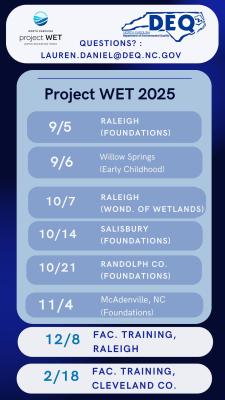About the Office of Water Education
The NCDEQ Division of Water Resources Office of Water Education is dedicated to supporting educators throughout North Carolina. The office strives to create programs, events and other resources to connect and engage communities with their local water resources. Below, you can find a list of a few existing programs the office offers, as well as some resources educators can use in their classrooms and beyond. If you're interested in learning how you can utilize these water education resources into your own programs, please contact Lauren Daniel by email at lauren.daniel@deq.nc.gov.
Click here to join the NC Water Education Listserv!
To view upcoming Project WET Workshops across North Carolina, click here.
Tools for Classroom Research
Learn about the water quality data associated with a stream or river. You can input a zip code and learn about the features in your watershed. This is a helpful tool for students doing research for an environmental project or for anyone curious to learn about their community's water resources.
Most people know North Carolina has 100 counties, but did you know that we boast 17 river basins? Each river basin has unique features. You can learn about all of our river basins on our Office of Environmental Education's NC River Basins Map.
NC DWR is responsible for various programs that conserve, protect, and restore our water resources. Learn from the maps that cover regulatory topics from animal feeding operations to impaired waters. To access, visit our page with DWR Maps.
Did you know that NC has 11 aquifers? Learn about groundwater here with our NC Groundwater Management Storymap. This resource is excellent for students, too!

More About Water Education Programs
NC Stream Watch is designed to:

- Teach about stream health through guided online surveys
- Support educational opportunities by sharing images of different types of streams and rivers across North Carolina
Interested in sharing your observations of your local stream to our statewide NC Stream Watch Map? You don't need to be a trained hydrologist to contribute.
Get started now with the NC Stream Watch Observation Survey.
Explore observations shared by NC Stream Watchers on our Observation Dashboard.
Make the Hydrosphere your favorite thing to teach! Project WET offers engaging activities for educators to use in their classrooms and outdoors. Activities are aligned with North Carolina's science/ELA/social studies/math curriculums.

Project WET workshops are fun, collaborative, and also showcase various resources available through NC Division of Water Resources. Visit the Project WET website to learn even more about the guides and resources available. You can also download electronic copies of their guides using the new WELL: Water Education Learning Library. The curriculum activities in the guides are formatted with the following water literacy principles:
- Water Has Unique Physical and Chemical Characteristics
- Water is Essential for All Life to Exist
- Water Connects all Earth Systems
- Water is a Natural Resource
- Water Resources are Managed
- Water Resources Exist within Social Constructs
- Water Resources Exist Within Cultural Constructs

2025 Project WET Workshops are currently being developed. If you'd like to host or attend Project WET workshop, please contact Lauren.Daniel@deq.nc.gov.
It's Our Water is a water quality curriculum designed for NC Teachers. This program is available through a self guided online module. This course is currently offered for free upon request. Upon homework completion, It's Our Water qualifies for 10 hours of EE Criteria I credit or paperwork to submit to your school district. These activities are coordinated with a series of videos, demonstrations and classroom activities covering everything from the hydrologic cycle to point and non-point source pollution. For more information, and to enroll in the course, email lauren.daniel@ncdenr.gov. Please note: Upon completion, students will NOT receive a Project WET guide. You must attend a Project WET workshop to receive a Project WET 2.0 guide. For more information: click here.

Connect with Water Education Networks

The NC Climate Education Network connects educators and climate scientists. This network is lead by a partnership between NC DEQ Educators and the NC State Climate Office. We offer quarterly open houses to learn about specific climate-related topics as well as hosting periodic "Climate Chats" for educators to learn about programs and other climate initiatives to incorporate into their programs. To learn more, check out the NC Climate Education Website.

Are you a water educator? Do you find yourself looking for the latest information to support water education in your classroom setting? We invite anyone to join us on the first Thursday of each month to join our water education discussion. These are informal discussions using MS Teams to connect educators from all corners of North Carolina to share ideas and find inspiration for their own programs. To register, join our mailing list here.
Do you offer large-scale or community-wide water education events? The NC Creek Week Network brings watershed groups, stormwater educators, and members from various local governments and non-profits to the same table to share strategies and support for hosting events. If you're looking to grow your own partnership, learn about existing resources, or enhance your events with new ideas, email lauren.daniel@ncdenr.gov to join our NC Creek Week Network!






